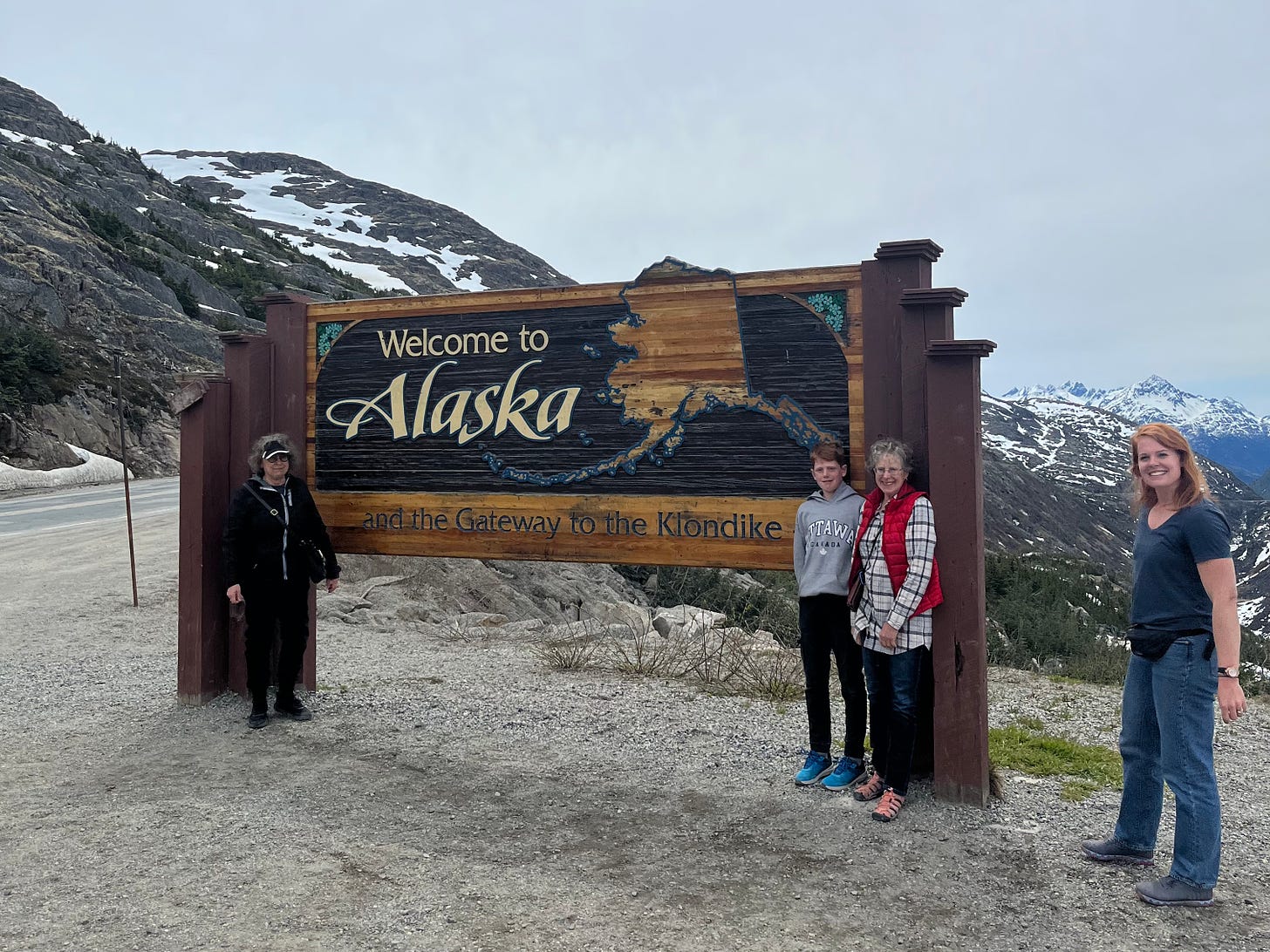Two weeks ago, I went to see my aunt in the hospital. She had been diagnosed with cancer only a month before, but it was too late to do anything. I drove four hours to the Niagara region, arriving around 11 pm. The nurses let me into her room, where she lay unconscious, deeply asleep, on the bed. I sat beside her for two hours, my hand on hers, watching her breathe robotically.
I looked around the tiny hospital room. She was lucky to have a window with a nice view from the 6th floor. My mother and my other aunt had brought flowers from the garden. A small electric candle burned on the window ledge, offering a glimmer of warmth through the night.
I thought about how fortunate I am to have spent so little time in hospitals. All my children were born at home, but one needed UV light therapy to help with jaundice, so we spent his third night of life in a hospital. Separated by the glass wall of the incubator, we both cried for hours.
My aunt showed no sign of recognizing my presence, but I spoke to her anyway. I’ve read stories about people who appear unconscious waking up later and saying they heard everything around them. I was always haunted by those stories. So I told my aunt that my kids said hello. I talked about the wonderful trip we took together to the Yukon last summer, for my sister’s wedding in Whitehorse. I recalled a funny incident that had made us both laugh to the point of tears.
I recalled the first time I ever flew on an airplane, at age 4, when I went to visit her in Winnipeg. My mother sewed me a dress for the occasion. It was blue and red with two big buttons. I felt more excited to wear the dress than to fly on a plane. My aunt had roommates, and I smashed a platter by accident when I was helping to put away dishes. My mom said we had to buy a new one, so we went for a long walk, and she carried a big white box home.
I told my aunt these stories, and she showed no sign of hearing, but it didn’t matter. I was telling the stories for myself, too.
Stories turned to quiet thoughts as the hours passed. I think it is impossible to be confronted with a person who is dying and not be overwhelmed with thoughts of one’s own mortality. To think about how little time each of us has on this earth.
Sometimes I read Stoic philosophy, especially when I want to be a better person. (That should be always, but often I’m so tired by the end of the day.) I keep a copy of Marcus Aurelius’ Meditations beside my bed. It’s surprisingly great; you should get a copy. He wrote, “You could leave life right now. Let that determine what you do and say and think.” It aligns with the famous Latin phrase, Memento mori, remember you must die. The kind of phrase that sends shivers up your spine while also, hopefully, spurring you to action.
What’s hard for me to process is that, while I am still relatively young, only in my mid-30s, I am now the age that I remember the adults around me being when I was a kid. It feels like an eerie moment of confluence—because now I know how it goes. I have seen what happens in the three decades between me visiting my aunt in Winnipeg and sitting by her deathbed in Niagara. And I’m travelling along that path, too.
I left the hospital at 1 am, driving through more darkness to my other aunt’s house to sleep. As I drove along the empty roads, I played the beautiful French music that my dying aunt loved.
She and her siblings, including my mother, had travelled extensively throughout their teen years in the 1970s, first spending a year driving around Europe and the Middle East with their parents in a VW van, then settling on the island of Crete for three years before moving to Paris to study at the Sorbonne and work as au pairs. Adventures like that can’t help but get imprinted on your soul, and the stories they told me about those travels become the soundtrack of my childhood. They infused me with a hunger to see the world.
My aunt died a day later. I had driven four hours home and was pulling in the driveway when my mom texted. “She’s gone.” I sat in my car and cried for a few minutes, for the woman whose life was taken so suddenly, but also at the sheer fragility of what we have.
Then my son appeared at the car window, grinning and holding a giant funnel cake he’d brought back from the fall fair.
“You’re back! Why are you crying?” he shouted through the glass.
I got out of the car. “She’s gone.”
His face showed genuine sadness. “I’m sorry. Have some funnel cake.”
***
A few days ago, my dad called to say my uncle had died (not related to my aunt).
I felt that now-familiar wave of sorrow wash over me—a sense of surprise and sadness at his time being over, but also grief at yet another adult who had a prominent presence in my life being gone from this world. He is the fourth significant adult in my life to die in the past year and a half. They are slipping away so fast. I miss them, and they’re barely gone.
It felt timely when a friend sent me an episode of the Modern Love podcast, featuring actor Andrew Garfield. Not a podcast I’ve listened to before, I was pleasantly surprised by the depth and relevance of the conversation, and the gorgeous essay Garfield read aloud that caused him to weep on air (I couldn’t help but join in).
Garfield mentioned the concept of “onism”, which I haven’t been able to stop thinking about. It’s defined by the Dictionary of Obscure Sorrows as:
“The frustration of being stuck in just one body, that inhabits only one place at a time, which is like standing in front of the departures screen at an airport, flickering over with strange place names like other people’s passwords, each representing one more thing you’ll never get to see before you die—and all because, as the arrow on the map helpfully points out, you are here.”
It is terrifying to be reminded of how limited we are, constrained by the years allotted to us, the bodies we’re born into, the geographical place we’ve chosen to live, the people we love and create and who stumble into the circle of our horizon, some staying and many leaving.
When I was young, I assumed I would eventually do everything I wanted to do. These were wild dreams, like live in Paris and Africa and the South Pacific, learn to play piano like a concert pianist, become a chef and a lawyer and a midwife and a war correspondent, study Arabic and Japanese, climb mountains, write bestselling novels, adopt orphans from India, sail and bike around the world.
Now I know I will do very few of those things because time is short and it’s moving quickly. Part of me wants to apologize to my 14-year-old self.
That does not mean I don’t love the life I’ve carved out for myself, in my quiet little corner of the world. And this sliver of life I inhabit has the potential to be as meaningful as any of the much bigger, more exotic adventures I dreamed of. But I’d be lying if I said there was no bittersweetness at the thought of relinquishing those dreams and facing the fundamental paradox that, in order to be anywhere, I must be somewhere.
And my somewhere is here, in my small office with a view of the dying leaves of fall, with my noisy children getting ready for school in the background. And I am trying to focus on finishing this, but I’m also wondering what to make for dinner later and how I’m going to get through all the work that awaits on the other side of this essay and hoping it pays enough to keep doing what I love. And I am wondering when I’ll get on an airplane next and why my mother-in-law still doesn’t want to meet her grandchildren after all these years and why my aunt lived for only a few weeks after her diagnosis and how I’d feel if that happened to me.
And I’m imagining that someday my own sons will be sitting by my deathbed, holding my hand, telling stories about things they remember from this brief, fleeting time we had together on earth.
This is it. This is all we get.
You Might Also Like:
In the News:
There has been lots of great coverage of my work promoting digital minimalism in recent weeks. Please check out these interviews I’ve done—and reach out if you want to chat! I recorded a podcast episode with QOL that has yet to be published, so stay tuned for that, too.
Radio New Zealand, Feature Interview: Strategies to keep your family analog
Newstalk 1010: A day in the life of a screen-free kid
On the Bay magazine: Childhood Lost
And of course, there’s my biweekly column for the Globe and Mail that stirred up plenty of controversy this week!
If You’re Looking for a Speaker…
I am looking to grow the public speaking side of my work, as it's one of my favourite things to do. I love speaking and interacting with audiences. So far, I've given talks and presentations to school groups, parent councils, service groups, churches, bookstores, and libraries. I've spoken all around Ontario and British Columbia, to European audiences via Zoom, and am scheduled to be in Toronto and Indianapolis in coming weeks.
I talk about the topic that is on every parent’s mind: kids + screens!
Anyone who is interacting with kids these days is concerned about screen-time habits, and I have loads of practical suggestions for how to deal with it, as well as personal experience from raising my own three school-aged kids. My “digital minimalist” approach is notably not anti-tech, but in favour of balancing its use in a reasonable and healthy way. Technology is a powerful tool, but it is not a toy, and parents can learn great strategies for putting it in its rightful place in the family home to promote their kids' well-being.
I offer smart, experienced, informed advice on tough topics like when to give a kid a smartphone, how to handle social media accounts, whether a kid is safe without a smartphone, how to say no and deal with a teen's FOMO, and why delaying is the best strategy.
Please reach out if you’d like to discuss rates and book a talk. Find contact info on my website.





Good morning Katherine, what a lovely submission you provided with us today and your reflections on your aunt and my sister and the brevity of the beautiful life we have. Thank you! Aunt Jane
Thank you for sharing this beautiful essay. You are wise beyond your years. I’m sorry for your losses. Perhaps you could print this essay and “snail mail” it to your mother-in-law. If she read it, she might realize what she’s missing. Your aunt was fortunate to have you by her side.